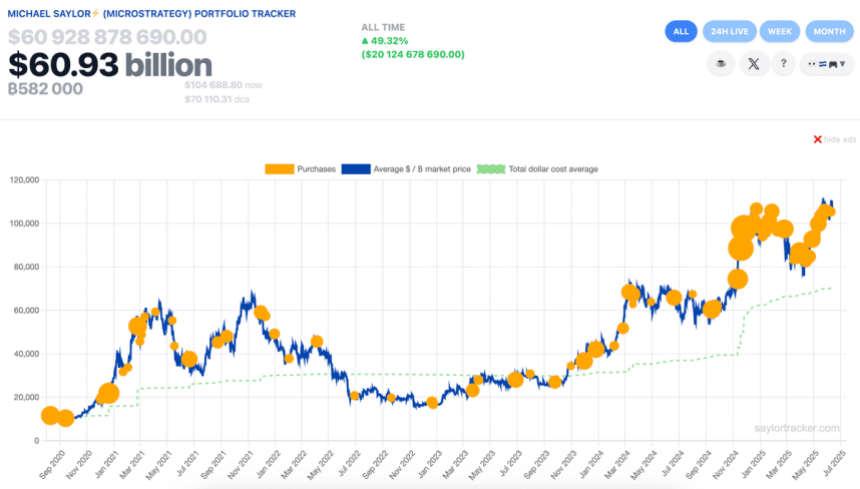Reason to trust

Strict editorial policy that focuses on accuracy, relevance, and impartiality
Created by industry experts and meticulously reviewed
The highest standards in reporting and publishing
Strict editorial policy that focuses on accuracy, relevance, and impartiality
Morbi pretium leo et nisl aliquam mollis. Quisque arcu lorem, ultricies quis pellentesque nec, ullamcorper eu odio.
In a bold and alarming statement, on-chain analyst OxChain raised the possibility of a catastrophic collapse involving Strategy (formerly MicroStrategy), the Bitcoin proxy firm co-founded by Michael Saylor. According to OxChain, this potential downfall could surpass the infamous collapse of FTX.
‘Strategy’s Bitcoin Tactics Resemble Ponzi Scheme’
In a recent post on X (formerly Twitter), OxChain expressed concerns about Strategy’s aggressive Bitcoin accumulation formula, suggesting that the company’s operations resemble a Ponzi scheme.
OxChain pointed out that since 2020, MicroStrategy has transformed from a traditional software company into a significant player in the Bitcoin market, currently holding around 582,000 BTC, valued at nearly $61 billion.
 Strategy’s Bitcoin acquisition data. Source: OxChain on X
Strategy’s Bitcoin acquisition data. Source: OxChain on XHowever, OxChain claims that this impressive figure is underpinned by leverage, debt, and shareholder dilution, rather than genuine conviction in the cryptocurrency.
The analyst outlined Strategy’s approach as a “cyclical financial loop”: the firm raises capital through shares or bonds, purchases Bitcoin, announces these purchases to drive up stock prices, and then raises more funds.
The analyst asserts that this cycle has worked as long as Bitcoin’s price continues to rise. However, with plans for a new $1 billion share sale, OxChain believes that Strategy is increasing its risk exposure.
Analyst Predicts Major Liquidation Risk
OxChain warns that Strategy’s average cost per Bitcoin is approximately $70,000, creating a precarious situation. The analyst adds that if Bitcoin’s price falls significantly below this level, the company’s treasury, currently valued at around $25 billion, could quickly start to suffer losses.
According to the analyst, despite Saylor’s public commitment to never sell Bitcoin, the realities of accounting and risk management may force the company to act if market conditions deteriorate.
In the first quarter of 2025, Strategy disclosed $5.9 billion in unrealized Bitcoin losses, revealing the volatility of its assets. Under the new accounting standard ASC 350-60, the company is required to report fair value, eliminating the ability to hide behind book value.
This transparency has already led to legal repercussions, with shareholders filing a class action lawsuit alleging that Strategy concealed the risks associated with Bitcoin’s volatility while aggressively raising capital.
OxChain further claimed during his social media thread that Strategy’s role as a Bitcoin access point is diminishing, especially as institutional capital flows into “more transparent and regulated options,” such as BlackRock’s iShares Bitcoin Trust (IBIT), which has amassed around $70 billion in assets under management.
The analyst stressed that unlike Strategy, which reportedly faces dilution risks and operates with limited safeguards, IBIT offers a “more stable investment” for those seeking exposure to Bitcoin.
If Strategy were to falter, the implications would be far-reaching, OxChain added. The firm holds approximately 2.77% of Bitcoin’s total supply, and a significant liquidation could send shockwaves through the market.
The analyst warns that a decline in Bitcoin’s price by just 22% from its average buy price could trigger corporate liquidations, potentially leading to one of the largest liquidation events in history.
Ultimately, OxChain cautions that Strategy is neither a hero nor a villain in the crypto ecosystem; instead, he said that it represents a “risk vector heavily reliant on leverage and market sentiment.”
Featured image from DALL-E, chart from TradingView.com

















 English (US) ·
English (US) ·